非谓语动词特殊句式
专题05 单项选择之非谓语动词和特殊句式:2023年中考英语真题分项汇编(全国通用)(解析版)
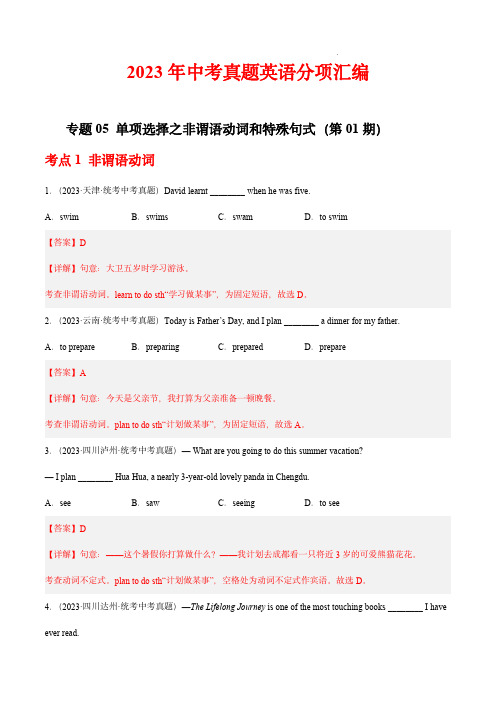
2023年中考真题英语分项汇编专题05单项选择之非谓语动词和特殊句式(第01期)考点1非谓语动词1.(2023·天津·统考中考真题)David learnt________when he was five.A.swim B.swims C.swam D.to swim【答案】D【详解】句意:大卫五岁时学习游泳。
考查非谓语动词。
learn to do sth“学习做某事”,为固定短语,故选D。
2.(2023·云南·统考中考真题)Today is Father’s Day,and I plan________a dinner for my father.A.to prepare B.preparing C.prepared D.prepare【答案】A【详解】句意:今天是父亲节,我打算为父亲准备一顿晚餐。
考查非谓语动词。
plan to do sth“计划做某事”,为固定短语,故选A。
3.(2023·四川泸州·统考中考真题)—What are you going to do this summer vacation?—I plan________Hua Hua,a nearly3-year-old lovely panda in Chengdu.A.see B.saw C.seeing D.to see【答案】D【详解】句意:——这个暑假你打算做什么?——我计划去成都看一只将近3岁的可爱熊猫花花。
考查动词不定式。
plan to do sth“计划做某事”,空格处为动词不定式作宾语。
故选D。
4.(2023·四川达州·统考中考真题)—The Lifelong Journey is one of the most touching books________I have ever read.—Yeah,the book is fantastic and I am looking forward to________it again.A.that,reading B.which,to read C.that,to read【答案】A【详解】句意:——《人世间》是我读过的最感人的书之一。
非谓语动词讲解(超全)

非谓语动词非谓语动词: a.动词不定式 b.动名词 c.分词( 现在分词过去分词)概述:1.谓语动词:在句子中担任谓语的动词2.非谓语动词:是动词的特殊形式,在句中可以作除谓语外的所有成分指出下列句子中非谓语动词的成分1,To see is to believe. 2, It is right to give up smoking.3, He wanted to go 4, I find it interesting to study English.5, He asked me to do the work with him. 6, I have some books for you to read.7, I came here to see you. 8, We were very excited to hear the news.9,Laying eggs is the ant queen’s full-time job. 10, It is no use arguing with him.11, Her job is teaching . 12.He had his clothes washed.13,We saw the teacher making the experiment. 14,The man standing by the window is our teacher.15,The excited people rushed into the building. 16,Being a student, I must study hard.17,The teacher stood there, surrounded by the students. 18,The news is inspiring.非谓语动词使用条件一个句子当中,已经存在一个主句(谓语动词),又没有连词的情况下, 还有别的动词出现时。
专题七 非谓语动词

A.learning
B.learns
C.learn D.to learn
解析:考查动词不定式的用法。find it+adj.+to do sth.“发现做某事怎么样”是一种 固定句式,故选D。
答案:D
3.We can’t work out the physics problem. Can you tell us ________?
②remember to do sth.记住要做某事动作未发生 remember doing sth.记得曾做过某事动作已发生
I remember posting your letter. 我记得把你的信寄出去了。(信已寄出) Please remember to post my letter. 请记住把我的信寄出去。(信尚未寄出)
My mother’s job is raising chicken. 我母亲的工作是养鸡。
3.作宾语 I don’t mind listening to that story again. 我不介意再听一遍那个故事。 4.作定语 Let’s join the singing group. 让我们加入合唱队吧。
③forget forget
to do sth.忘记做某事动作未发生 doing sth.忘记做过某事动作已发生
I forgot to bring my ho mework. 我忘记带 作业了 。( 没带作 业) I forgot bringing my homework. 我忘记已 把作业 带来了 。( 作业已 带来)
⑥allo w allo w
doing sth.允许做某事 sb.to do sth.允许某人做某事
We don't allow s moking here. 我们不允 许在这 儿吸烟 。
专题05 单项选择之非谓语动词和特殊句式-中考英语真题分项汇编(全国通用)(解析版) 2
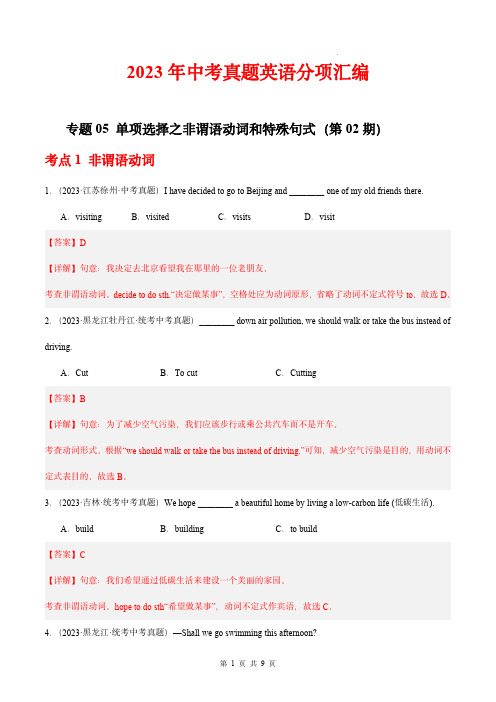
2023年中考真题英语分项汇编专题05单项选择之非谓语动词和特殊句式(第02期)考点1非谓语动词1.(2023·江苏徐州·中考真题)I have decided to go to Beijing and________one of my old friends there.A.visiting B.visited C.visits D.visit【答案】D【详解】句意:我决定去北京看望我在那里的一位老朋友。
考查非谓语动词。
decide to do sth.“决定做某事”,空格处应为动词原形,省略了动词不定式符号to,故选D。
2.(2023·黑龙江牡丹江·统考中考真题)________down air pollution,we should walk or take the bus instead of driving.A.Cut B.To cut C.Cutting【答案】B【详解】句意:为了减少空气污染,我们应该步行或乘公共汽车而不是开车。
考查动词形式。
根据“we should walk or take the bus instead of driving.”可知,减少空气污染是目的,用动词不定式表目的。
故选B。
3.(2023·吉林·统考中考真题)We hope________a beautiful home by living a low-carbon life(低碳生活).A.build B.building C.to build【答案】C【详解】句意:我们希望通过低碳生活来建设一个美丽的家园。
考查非谓语动词。
hope to do sth“希望做某事”,动词不定式作宾语,故选C。
4.(2023·黑龙江·统考中考真题)—Shall we go swimming this afternoon?—I would rather________at home than________swimming.A.stay;going B.stay;go C.to stay;to go【答案】B【详解】句意:——今天下午我们去游泳好吗?——我宁愿待在家里也不愿意去游泳。
超详细非谓语动词讲解精编版

非谓语动词(the Non-Finite Verbs)定义在句子中不是谓语的动词,形式:不定式、动名词和分词(现在分词和过去分词)作用:在句子中充当主语、宾语、状语等。
特点:1.非谓语动词可以有名词作用(如动词不定式和动名词),在句中做主语、宾语、表语。
2.非谓语动词可以有形容词作用(如动词不定式和分词),在句中做定语、表语或宾语补足语。
3.非谓语动词可以有副词作用(如动词不定式和分词),在句中作状语。
4.谓语动词在句中作谓语,受主语的人称和数的限制;非谓语动词在句中不能单独作谓语,它不受主语的人称和数的限制。
5.英语中不能单独做句子的谓语。
与谓语动词的关系相同点(1)如果是及物动词都可与宾语连用,例如:They built a garden. They suggested building a garden.(2)都可以被状语修饰:The suit fits him very well. The suit used to fit him very well.(3)都有主动与被动, “体”式(一般式;进行式;完成式)的变化。
例如:He was punished by his parents.(谓语动词被动语态)He avoided being punished by his parents.(动名词的被动式)We have written the composition.(谓语动词的完成时)Having written the composition, we handed it in.(现在分词的完成式)(4)都可以有逻辑主语They started the work at once.(谓语动词的逻辑主语)The boss ordered them to start the work.(动词不定式的逻辑主语)We are League members.(谓语动词的主语)We being League member, the work was well done. (现在分词的逻辑主语)不定式一、形式功能:动词不定式:(to)+do,具有名词、形容词、副词的特征。
(完整版)非谓语动词(不定式)的用法

非谓语动词(动词不定式的具体用法)Step1. 动词不定式的3大语法功能(1)不定式可充当主语,宾语,表语,具有名词的功能.(2)不定式可充当后置定语或宾语补足语,具有形容词的功能.(3)不定式可充当状语,具有副词的功能..Step2.不定式的构成,即:“不定式符号to+动词原形”.Step3. 不定式的否定式,否定词一定放在不定式符号之前,即:“not/never+不定式+动词原形.一,不定式作主语的用法.特点:“to+动词原形”所形成的形式具有名词功能.名词可在句中充当主语,宾语或者表语,同理,不定式也有相同的功能.1. 不定式作主语的特点:(1)可以表示一种意愿或未完成的事.(2)谓语动词用单数.E g: To win the championship is my ambition.主语系动词表语译文:赢得冠军是我的雄心.E g: To master a foreign language is necessary.主语系动词表语译文:掌握一门外语是有必要的.E g: To become President of the United States used to be my goal.主语谓语宾语译文:过去我的梦想是成为美国总统2. 不定式作主语时,be动词之后的表语若是名词,一定是表示意愿,目的,企图等名词,用来表示尚未完成的事情.常见的此类名词有:plan(计划), purpose(目的),attempt(企图),goal(目标), aim(目的), ambition(雄心),dream(梦想), ideal(理想), wish(希望/愿望),hope(希望), decision(决定),determination (决定),proposal(提议/建议).E g: To speak perfect English is always my dream主语系动词表语译文:说一口流利的英语一直是我的梦想.3. 由于不定式短语作主语,显得主语过长,为了避免头重脚轻,达到句子平衡,把不定式短语放在句末,在原来主语的位置上“it”代替,形式上占一个主语的位置,称之为形式主语,不定式称为真正的主语.E g: It is necessary to protect the environment.形式主语系动词表语不定式作真正主语译文:保护环境是有必要的.4. 不定式作主语的两种特殊结构(1)句型:It is +adj(形容词)+of sb +to do sth.(2) 句型:It is +adj(形容词)+for sb +to do sth.特点和区别:(1)若形容词表示人的本质特征,特性,就用“of”引出的不定式的逻辑主语.A:表示人的本质特征和特性的形容词有:“good; nice; clever; wise; foolish; silly; stupid; rude; (im)polite , careless; careful; affable.E g: It is very affable of you to help me.译文:你真好帮助我.E g: It is very careless of you to lose your wallet.译文:你真粗心大意把钱包丢了.(2) 若形容词表示的不是逻辑主语的特性,而是描述对逻辑主语所做的事情,就用介词“for”,B:常见的此类形容词有:“easy; hard; difficult; heavy; necessary; impossible; important.E g: It is impossible for me to get to the destination on time inan hour.译文:一个小时之内按时达到目的地对我来说是不可能的.E g: It is very difficult for me to work out the math problem.译文:解决这个数学问题对我来说太难了.(3) 形容词表示人的特性的句子可转化成一个不定式作状语的句子,而后者则不能.E g: It is very kind of you to help me with my English可转化为一个不定式作状语的句子= You are very kind tohelp me with my English.二,不定式作宾语的用法.(1)作及物动词的宾语,该及物动词均为表示意愿,企图的动词,表示具体的或者特定的动作,或者是将来的动作.常见的动词如下:want(要); wish(希望); hope(希望); desire (欲望/渴望); intend意图;try(设法); determine(决定); decide(决定); attempt(企图); endeavor(努力); plan(计划); like(喜欢); love(喜欢); expect(期望/盼望);pretend(假装); afford(承担得起); manage(设法); prepare(准备); long (盼望); arrange(安排); promise(答应/许诺); learn(学会);dare(敢);agree(同意);start/begin(开始); fail(失败); refuse(拒绝); 等.E g: I want to take a trip abroad next year.主语及物动词不定式作宾语时间状语译文:明年我要出国旅游.E g: I intend to visit you tomorrow主语及物动词不定式作宾语时间状语译文:我打算明天去拜访你.E g: He tried to kill two birds with one stone.译文:他设法一箭双雕.E g: I expect to get a raise.译文:我渴望获得加薪.E g: I can’t afford to buy a new car.主语及物动词动词不定式作宾语译文:我买不起新车.(2)若作宾语的不定式太长,如果其后还有形容词或名词担当宾语补足语,常用“it”作形式宾语,把不定式短语作真正的宾语后置.基本句式:“主语+及物动词+it(形式宾语)+名词/形容词(宾语补足语)+to+动词原形(真正宾语)”.常见的此类动词有“find(发现); think(认为); believe(相信); consider(认为); deem(认为); feel(觉得); make(使)E g: I think it useful to learn English well.主语及物动词形式宾语宾补不定式作真正的宾语译文:我认为学好英语是很有用的.E g: I deem it necessary to apologize to others.主语及物动词形式宾语宾补不定式作真正的宾语译文:我认为向别人道歉是有必要的.E g: I deem it an honor for me to give this speech.译文:能在这里进行演讲我认为这是我的荣幸.E g: We found it impossible to finish the project in a month.主语及物动词形式宾语宾补不定式作真正的宾语译文:我发现一个月之内完成这个项目是不可能的.E g: I make it a rule to get up early.说明:Make it a rule to+v 表示“把--------当作常例/习惯于-------------”.译文:我习惯早起.E g: The teacher made it a rule to speak only English in class.主语及物动词形式宾语宾补不定式作真正的宾语地点状语.译文:老师规定在课堂上这能讲英语.E g: I felt it stupid for him to talk like that.译文:我觉得他这样讲话挺愚蠢的.(3)疑问代词:“what ; which; whom +动词不定式(to+do)”共同作及物动词的宾语的用法特点:不定式后面的动词一定为及物动词,疑问单词“what ; which; whom”及物动词或者介词的宾语.E g: I can’t decide which one to buy.主语及物动词共同作宾语译文:我决定不了买哪一个.know what to do next.E g: I don’t译文:我不知道下一步该怎么办.E g: I can’t decide whom to turn to for help.译文:我决定不了向谁求救.E g: I hardly know what to say to you.译文:我简直不知道该对你说什么.(4)疑问代词:“what ; which; whom +动词不定式(to+do)”共同作及物动词直接宾语的用法E g: Would you please tell me which course to take?主语及物动词间接宾语直接宾语译文:你能告诉我应该选哪门课程吗?(5)疑问副词:“when; where; how;whether+动词不定式(to+do)”共同作及物动词宾语的用法特点:(1)不定式后面的动词可以为不及物动词.(2)不定式后面的动词也可为及物动词,且后面有宾语.E g: He patiently showed me how to operate the computer.主语状语及物动词间接宾语直接宾语译文:他耐心地教我怎么使用电脑.tell me when to start.E g: He didn’t译文:他并没有告诉我什么时候出发.know whether to go or stay.E g: I don’t译文:我不知道是走还是留.E g: I just wonder where to spend the weekend.译文:我只是想知道该去哪里度过周末.E g: Life is long if you know how to live it.译文:若知如何使用,生命就会长久.三,不定式作表语的用法.特点:(1)主语均为表示:“意愿”或者“企图”的名词.(2)不定式作表语可换作主语.E g: His only wish at present is to sleep.主语时间状语系动词动词不定式作表语译文:他此刻唯一的愿望就是去睡觉.可转化为:To sleep is his only wish at present.E g: His goal is simply to become an excellent English teacher.主语系动词状语动词不定式作表语译文:他的目标就是当一名优秀的英语教师.E g: His resolution is to become a great scientist.主语系动词动词不定式作表语译文:他的志愿时当一名伟大的科学家.E g: My dream is to become a successful businessman.译文:我的愿望是成为一名成功的商人.E g: The problem is to find a solution.译文:问题是得找出一个解决办法.E g: Shaking one’s fist is to show one’s determination.译文:挥拳头是显示一个人的决心.E g: The purpose of yelling English is to build up your confidence.译文:大喊英语的目的是建立你的自信心.不定式作表语的2种特殊情况(1)动词不定式作主语,也可作be动词之后的表语,主语和表语的动词形式一定要对称.E g: To see is to believe不定式作主语系动词不定式作表语译文:眼见为实E g: To love her this way is to worship her.不定式作主语方式状语系动词不定式作表语译文:这样爱他就等于崇拜她.(2)在下列句型中,be动词之后的to可省略,接动词原形作表语.E g: All you have to do is (to) take a good rest.主语系动词表语译文:你所要做的就是要好好的休息.E g: All I can do is (to) wait主语系动词表语译文:我所能做的就是等待.E g:What you should do is simply (to) apologize to him主语系动词状语表语译文:你应该做的事就是向他道歉.四,不定式作后置定语的用法.相当于形容词的功能.特点:(1)动词不定式作定语时一定要放在所修饰词的后面,作后置定语.(2)动词不定式与所修饰的名词之间有动宾关系.(3)不定式后面的动词为及物动词,若为不及物动词,一定要加上相应的介词.E g: I have a pile of homework to do tonight.主语及物动词宾语不定式作后置定语时间状语.译文:今晚我有一大堆的作业要做.不定式作后置定语的特殊用法(1)不定式作后置定语可以等于关系代词作主语所引导的定语从句.E g: I have no friend to advise me.主语谓语宾语不定式作后置定语等价于:I have no friend who can advise me.译文:我没有朋友可以给我忠告.(2)不定式作后置定语可以等于关系代词作宾语所引导的定语从句.E g: I have no one to talk to主语谓语宾语不定式作后置定语等价于:I have no one whom I can talk to.译文:我没有人可以交谈.E g: There are many sights to see here.等价于:There are many sights which we can see here.译文:这里有很多的风景可看.(3)主动的不定式和被动不定式的区别. A: 如果句子的主语是要做那件事的人,就用主动形式.B: 如果句子的主语是要做的动作(或者是接受动作的人或事),就用被动式.E g: I have two coats to wash.E g: Two coats are to be washed.(4) 在:“there be ”结构中的不定式可用主动式,也可用被动式,且意思一样.E g: There is an important thing to do tonight= There is an important thing to be done tonight.(5)不定式修饰序数词一定要放在其后.A:Li was the first to arrive.B: Really? That’s not like him. He’s always the last one to arrive.A: 李是第一个到的.B: 真的吗?那可不像他的作风,他总是最后一个到.五,不定式作状语的用法.特点:不定式作状语多放在被修饰的动词,副词,和形容词之后.注意其逻辑主语必须和句子的主语保持一致.在句中充当状语,表示目的;结果或原因.(1)不定式修饰动词的用法,一定置于该动词之后.E g: We should do whatever we can to save them.主语及物动词宾语从句不定式作目的状语的用法译文:我们应该做些什么才能挽救他们呢.(2) 不定式修饰动词作目的状语的用法.特点:不定式作目的状语,通常置于动词之后,也可置于句首,用逗号与主语隔开.E g: You should work very hard to win the award.主语谓语状语不定式作目的状语等价于:To win the award, you should work very hard译文:为了要赢得这个奖项,你应该努力奋斗.E g: I’ll do everything I can to help you.(目的)译文:我会竭尽全力帮你的.E g: You’re really very kind to say so.(原因)译文:你这么说真是太好了.还有类似不定式短语有:(1)in order to+动词原形..即可放在句首,也可句末.(2)so as to+动词原形.只能放在句末.(3)only to;(4) too-------to 太-------而不能(3)with an eye to +动名词. 只能放在句中. (4)with a view to +动名词. 只能放在句中.E g: He got up early in order to catch the school bus.主语谓语不定式作目的状语译文:他早起的目的就是能搭上校车.(3)不定式修饰形容词,一般置于该形容词之后.特点:一般表示一种结果.E g: He is able to do amazing things.主语系动词表语不定式作结果的用法译文:他能成就伟业.E g: He is apt to lie to me .主语系动词表语不定式作结果的用法.译文:他爱向我撒谎.E g: She was prepared to face the music.译文:她准备好面对后果.疯狂操练:I’m determined to conquer English. 我决心攻克英文I’m determined to master pronunciation. 我决心攻克发音.I’m determined to speak good English. 我决心说好英语.I’m determined to become a grammar king. 我决心成为语法大王I’m determined to command a lot of words. 我决心掌握大量词汇.I’m determined to write beautiful articles. 我决心写出漂亮文章.I’m determined to communicate with the world. 我决心与全世界沟通.(4)不定式修饰副词,一定置于该副词之后. 特点:一般表示一种结果.E g: He is old enough to go swimming alone.主语系动词表语状语(副词)不定式作结果的用法. 译文:他长大了,足以单独一个人去游泳.五,不定式作宾语补足语的用法.(1)具有使役动词意味的及物动词,加上宾语之后,要用不定式短语作宾语补足语.此类动词有:1) cause/get 促使-----------;2) lead引导--------说明:‘加上宾语之后,可接to引导的不定式短语,但此时to视为介词,接动名词作其宾语”;3) allow/permit允许------4)advise 劝告---------5)persuade说服----------6)enable使能够----------7)tell告诉-------8)beg/ask请求--------9)order命令---------10)want/wish/expect/intend期望---------11)force 迫使----------------.12)encourage鼓励-------.E g: The sad story caused him to cry.主语及物动词宾语不定式作宾语补足语译文:这个悲惨的故事使他哭了.E g: His timely help enabled me to finish the project in advance.主语及物动词宾语不定式作宾补时间状语译文:他及时的帮助使我能提前完成这个项目.allow me to smoke in the office.E g: They don’t主语及物动词宾语不定式作宾补地点状语译文:他们不允许我在办公室里吸烟.E g: I ask my students to yell English every morning.主语及物动词宾语不定式作宾补时间状语译文:我要求我的学生每天早上都大喊英语.E g: My parents want me to become a great lawyer in thefuture.译文:我的父母希望我将来成为一位很棒的律师.E g: The boss forces his staff to work like a dog for him.译文:老板强迫员工为他拼命干活.E g: My teacher encouraged me to try again.译文:我的老师鼓励我再试一次.(2)使役动词或者是感官动词,动词不定式作宾语补足语“to”要省略.巧记不定式作宾补省略“to”的两大规则A:“注意让‘买客’听听看看这块表有啥感觉不带“土”B: 五看(see; watch; notice; observe; look at); 三让(let; make; have);两听(hear; listen to); 一感觉(feel); 一发现(find); 半个帮(help).1)感官动词,宾语补足语接原型动词,表示已发生的事实..若出现在被动语态中,“to”要还原.E g: I noticed a thief slip into my room just now.主语及物动词宾语省略不定式原型动词作宾补时间状语译文:我刚才注意一个贼溜进我的房间了.E g: I never heard him speak English.译文:我从未听过他说英语.E g: The man was seen to leave the accident.(被动语态中不定式要还原)译文:有人看见他离开事故现场.2)使役动词(make/ let/ have)的具体用法.{1}“make”的常见用法. 若出现被动语态时“to”要还原.※make +宾语+宾补(形容词)E g: The news made me happy.主语及物动词宾语形容词从当宾语补足语.译文:这则消息使我很开心.※make+宾语+宾补(省略“to”的动词原形).疯狂操练 E g: My mother made me walk the dog. My father made me sweep the floor. My grandmother made me wash the dishes. My grandfather made me buy him cigarettes. Everyonein me family made me do something yesterday. I really enjoy helping other people.译文:我妈妈让我去遛狗.我爸爸让我擦地板.我奶奶让我洗碗.我爷爷让我给他买烟.昨天家里的所有人都让我干活了.我真的很乐意帮助他人.E g: These workers are made to work at least 18 hours each day.译文:这些工人被迫每天至少工作18小时.{2}“let”的用法. 很少出现被动语态中.※Let’s +动词原形. 让我们一起-------------------------E g: Let’s have dinner together tonight. 译文:让我们今晚一起吃晚饭.※Let us +动词原形. 让我们一起------------E g: Let us help Tom clean the room. 译文:让我们大家一起帮助汤姆打扫房间.※Let sb++动词原形. 让某人做某事.E g: Let me help you. 译文:让我来帮助你. {3}“have”的用法. 很少出现被动语态中.※have +宾语(人/)+宾补(过去分词充当)表示:请某人做某事※have +宾语(物/)+宾补(过去分词充当)表示:可以用来主语的遭遇或经历,并不是故意让某事发生的.特点:1) 作宾语补足语的动词与宾语之间是被动关系.2)该动作常不属于主语的动作.E g: I had my hair cut yesterday主语使役动词宾语过去分词作宾补时间状语译文:我昨天理的发.E g: Please have the boy taken to the station.译文:请找人把这男孩带到E g: The old man had his leg broken when he fell off the bike.译文:那老人从自行车上摔下来时把腿摔断了.※have+宾语(人/)+宾补(动词原形)表示“让某人做某事”E g: The director had his assistant pick up some hot dogs for the meeting.译文:主管让他的助理为这次会议准备一些热狗.※have+宾语(人/物)+宾补(动名词)表示:“让某人或某事不停地,或者一次又一次地进行某一动作.E g: He had us laughing all through. 译文:整顿饭期间他让我们笑个不停.六,不定式充当独立主格的用法.特点:不定式可以在句中充当独立成分,用来说明说话人的态度,对全句进行解释常见的有:“to be frank; to be honest; to tell the truth; to be blunt”等E g: To tell the truth, I have no money with me today.译文:我今天一分钱也没有带.E g: To be frank, you need to lose weight.译文:坦白说,你真的需要减肥.E g: To be blunt, that’s a stupid idea.译文:老实说,这想法真愚蠢.七,原型不定式的特殊结构.下列为与原型不定式连用的特殊结构.这些结构经常出现在各类英语考试中,务必要牢记.1): do nothing but +动词原形. 除了-----,无所事事.E g: He did nothing but eat all day.译文:他整天什么也不做,只是吃.分析步骤如下:第一步:句中的but 可视为并列连词,连接对等且形态相同的词类did,即He did nothing but did----------.第二步:我们知道do/does/did用于肯定句中,可视为强调性的助动词,之后要接动词原形.试比较:未强调前: He works hard. 他用功. 强调后:He does work hard. 他的确很用功.第三步:因此,在He did nothing but did----------中,did之后要接动词原形.即He did nothing but did eat all day.第四步:并列连词but之后相同的词类可以省略.本句中第一个did为不及物动词的一半过去时,而第二个did则为强调性的助动词,虽然性质不一,但外形相同,故第二个did可省略,即:“He did nothing but eat all day”.2): Choose/expect/want/desire nothing but to+动词原形.E g: He wanted nothing but to sleep. 译文:他什么都不要,只想睡觉.3): I have no choice but to+动词原形. 除了-------我别无选择.E g: I have no choice but to wait for the result.译文:除了等待结果我别无选择.4): be interested in nothing but+动名词/名词. 除了-----对什么也不感兴趣.E g: He is interested in nothing but singing.译文:他除了唱歌外,对什么都不感兴趣.5)enjoy nothing but+动名词/名词. 除了-----------对什么都不喜欢.E g: I enjoy nothing but dancing.译文:我除了跳舞外什么都不喜欢.6)cannot but+动词原形=cannot help/stop/ resist+动名词=cannot help but+动词原形.意思为:“不得不/忍不住-----------------”.E g: When I heard the story, I couldn’tb ut laugh/I couldn’thelp but laugh. 译文:我听到这个故help laughing/I couldn’t事,忍不住笑了出来.八,在下列含有to的动词短语中to 是介词的有,注意:“介词后面要接名词、宾格代词、动名词”如下:“1)be used to----------习惯于-------; 2)devote--------to献身于-------;3)get down to-------开始、着手-------;4)lookforward to-----期望、期盼;5)object to-----反对;6)be opposed to-----反对; 7)pay attention to-------注意、关注; 8)stick to---------;9)apply------to集中精力、专注坚持10)accustom-------to使------习惯于;11)help oneself to ------请随便------”等.E g: You should pay more attention to your health.译文:你应该多加注意身体.疯狂操练:You should pay more attention to your pronunciation. 你要多留意你的发音.You should pay more attention to your kids. 你要多留心你的孩子.You should pay more attention to your teeth. 你要多注意保护牙齿.You should pay more attention to your family.你要多关心家人. You should pay more attention to your schoolwork.你要多花心思在学业上.You should pay more attention to our environment.我们应该多关注保护环境.E g: She applied herself to learning English.译文:她刻苦学习英语.E g: You must accustom yourself to getting up early译文:你必须习惯早起.E g: I’ve been looking forward to hearing from you.译文:我一直期望收到你的来信.疯狂操练:Help yourself to something to drink. 你自己随便喝点什么,别客气.Help yourself to something to eat.你自己随便吃点什么,别客气.Make yourself at home. 别拘束.Sit down and relax for a while.坐下来放松一下.My home is your home.我的家就是你的家.。
单项选择之非谓语动词和特殊句式 - 2024年中考英语真题分类汇编(全国通用)(原卷版答案解析版)
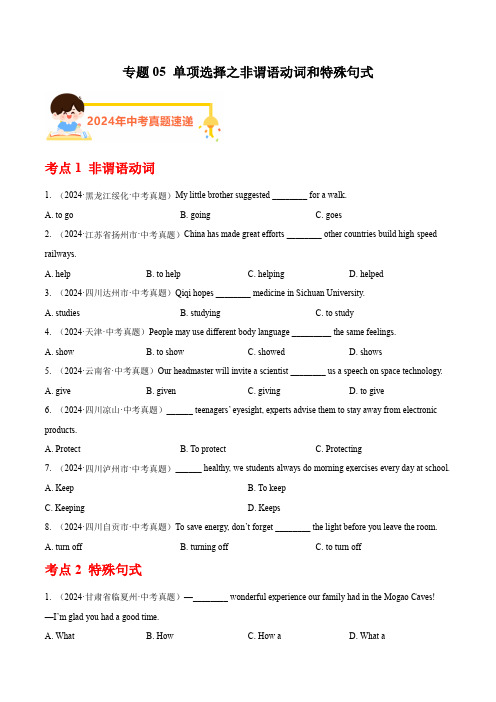
专题05 单项选择之非谓语动词和特殊句式考点1 非谓语动词1. (2024·黑龙江绥化·中考真题)My little brother suggested ________ for a walk.A. to goB. goingC. goes2. (2024·江苏省扬州市·中考真题)China has made great efforts ________ other countries build high-speed railways.A. helpB. to helpC. helpingD. helped3. (2024·四川达州市·中考真题)Qiqi hopes ________ medicine in Sichuan University.A. studiesB. studyingC. to study4. (2024·天津·中考真题)People may use different body language _________ the same feelings.A. showB. to showC. showedD. shows5. (2024·云南省·中考真题)Our headmaster will invite a scientist ________ us a speech on space technology.A. giveB. givenC. givingD. to give6. (2024·四川凉山·中考真题)______ teenagers’ eyesight, experts advise them to stay away from electronic products.A. ProtectB. To protectC. Protecting7. (2024·四川泸州市·中考真题)______ healthy, we students always do morning exercises every day at school.A. KeepB. To keepC. KeepingD. Keeps8. (2024·四川自贡市·中考真题)To save energy, don’t forget ________ the light before you leave the room.A. turn offB. turning offC. to turn off考点2 特殊句式1. (2024·甘肃省临夏州·中考真题)—________ wonderful experience our family had in the Mogao Caves!—I’m glad you had a good time.A. WhatB. HowC. How aD. What a2. (2024·黑龙江龙东地区·中考真题)—Li Lei won the first place. ________ good news it is!—Yes, we’re all happy for him.A. HowB. What aC. What3. (2024·黑龙江龙东地区·中考真题)—The old man never feels lonely, ________?—No, because he has many friends.A. does heB. won’t heC. doesn’t he4. (2024·黑龙江齐齐哈尔·中考真题)—Tom will have a birthday party next Sunday. Do you want to go?—If you go, ________.A. so I willB. so will IC. neither will I5. (2024·黑龙江绥化·中考真题)“Li Ming, ________ your homework first, and you can watch TV for 30 minutes.” said his mum.A. doesB. didC. do6. (2024·黑龙江绥化·中考真题)—It was sunny several minutes ago, but it’s raining heavily now!—________ difference a day makes!A. WhatB. What aC. How7. (2024·四川乐山·中考真题)______ amazing it is! The Shenzhou XVIII members raise fish for the first time in Tiangong space station.A. WhatB. HowC. What an8. (2024·四川遂宁市·中考真题)—Hi, guys! Our team won the first place in the table tennis match.—________ exciting news it is! We are so happy about it.A. WhatB. HowC. What anD. How an9. (2024·云南省·中考真题)________ meaningful day! We volunteered to clean up our city park.A. HowB. WhatC. What aD. What an答案解析专题05 单项选择之非谓语动词和特殊句式考点1 非谓语动词1. (2024·黑龙江绥化·中考真题)My little brother suggested ________ for a walk.A. to goB. goingC. goes【答案】B【解析】句意:我的小弟弟建议去散步。
中考英语非谓语动词

中考英语非谓语动词非谓语动词基本形式动词:He asks me to help him often.谓语非谓语1.谓语动词:时态/被动语态2.非谓语:do/ to do/ doing/ done非谓语动词的判定非谓语动词一直是英语学习的难点,也是中考的常考点,主要为动词不定式和动名词,在单项填空、词形填空和词组翻译题型中均有涉及。
学生在做此类试题时应先分析本题该用谓语动词还是非谓语动词,然后才能确定选用动词的哪种形式或者非谓语的哪种形式。
如何确定使用动词的哪种形式具体讲解详见动词的时态,下面列举几种常见的判定非谓语动词形式的方法:1.如何判定本题该使用谓语动词还是非谓语动词:判断句子是否缺少谓语。
①当句子缺少谓语时,该动词就用谓语动词形式。
一般情况下,动词作谓语放在主语之后,如“I love you.”中,love就是谓语动词。
②当句中已有谓语动词又没有并列连词与所填动词并列时,该动词就用非谓语动词形式。
非谓语动词可以在句子中作除谓语以外的任何成分,如主语、宾语、宾语补足语、表语、动词不定式的特殊句型:①too…to… “太……而不能……”。
如:The boy is too young to look after himself. 那个男孩太小而不能照顾自己。
②…enough to…“……足够……”。
如:He is old enough to go to school. 他足够大能去上学了。
③Why don’t you +省略to的不定式?=Why not +省略to的不定式?为什么不……呢?如:Why don't you get her a photo album? =Why not get hera photo album? 为什么不给她买个相册呢?④had better+(not)+省略to的不定式。
最好(不要)做……如:You'd better not stay here today. 你今天最好别待在这儿。
高中英语语法――非谓语动词讲解
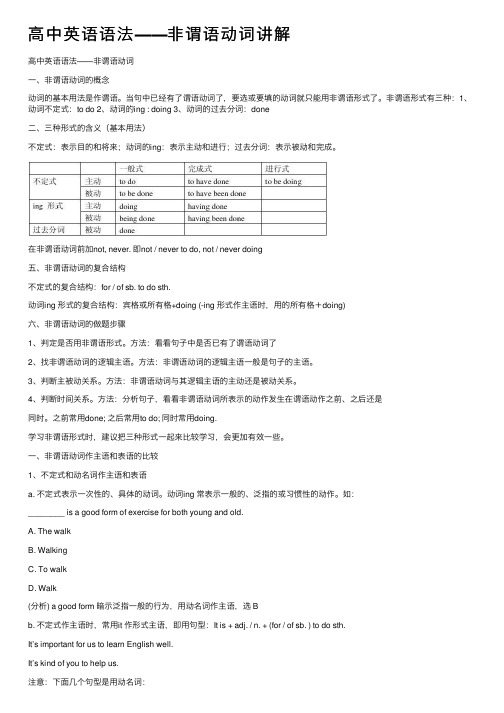
⾼中英语语法――⾮谓语动词讲解⾼中英语语法――⾮谓语动词⼀、⾮谓语动词的概念动词的基本⽤法是作谓语。
当句中已经有了谓语动词了,要选或要填的动词就只能⽤⾮谓语形式了。
⾮谓语形式有三种:1、动词不定式:to do 2、动词的ing : doing 3、动词的过去分词:done⼆、三种形式的含义(基本⽤法)不定式:表⽰⽬的和将来;动词的ing:表⽰主动和进⾏;过去分词:表⽰被动和完成。
在⾮谓语动词前加not, never. 即not / never to do, not / never doing五、⾮谓语动词的复合结构不定式的复合结构:for / of sb. to do sth.动词ing 形式的复合结构:宾格或所有格+doing (-ing 形式作主语时,⽤的所有格+doing)六、⾮谓语动词的做题步骤1、判定是否⽤⾮谓语形式。
⽅法:看看句⼦中是否已有了谓语动词了2、找⾮谓语动词的逻辑主语。
⽅法:⾮谓语动词的逻辑主语⼀般是句⼦的主语。
3、判断主被动关系。
⽅法:⾮谓语动词与其逻辑主语的主动还是被动关系。
4、判断时间关系。
⽅法:分析句⼦,看看⾮谓语动词所表⽰的动作发⽣在谓语动作之前、之后还是同时。
之前常⽤done; 之后常⽤to do; 同时常⽤doing.学习⾮谓语形式时,建议把三种形式⼀起来⽐较学习,会更加有效⼀些。
⼀、⾮谓语动词作主语和表语的⽐较1、不定式和动名词作主语和表语a. 不定式表⽰⼀次性的、具体的动词。
动词ing 常表⽰⼀般的、泛指的或习惯性的动作。
如:________ is a good form of exercise for both young and old.A. The walkB. WalkingC. To walkD. Walk(分析) a good form 暗⽰泛指⼀般的⾏为,⽤动名词作主语,选 Bb. 不定式作主语时,常⽤it 作形式主语,即⽤句型:It is + adj. / n. + (for / of sb. ) to do sth.It’s important for us to learn English well.It’s kind of you to help us.注意:下⾯⼏个句型是⽤动名词:It’s no good / use doing sth.It’s useless doing sth.There is no need to do sth.2、不定式、动名词、分词作表语的⽐较1、不定式、动名词作表语,.表⽰主语的内容。
超详细非谓语动词讲解

超详细非谓语动词讲解 TYYGROUP system office room 【TYYUA16H-TYY-TYYYUA8Q8-非谓语动词 (the Non-Finite Verbs)定义在句子中不是谓语的动词,形式:不定式、动名词和分词(现在分词和过去分词)作用:在句子中充当主语、宾语、状语等。
特点:1.非谓语动词可以有名词作用(如动词不定式和动名词),在句中做主语、宾语、表语。
2.非谓语动词可以有形容词作用(如动词不定式和分词),在句中做定语、表语或宾语补足语。
3.非谓语动词可以有副词作用(如动词不定式和分词),在句中作状语。
4.谓语动词在句中作谓语,受主语的人称和数的限制;非谓语动词在句中不能单独作谓语,它不受主语的人称和数的限制。
5.英语中不能单独做句子的谓语。
与谓语动词的关系相同点(1)如果是及物动词都可与宾语连用,例如: They built a garden. They suggested building a garden.(2)都可以被状语修饰: The suit fits him very well. The suit used to fit him very well.(3)都有主动与被动, “体”式(一般式;进行式;完成式)的变化。
例如:He was punished by his parents.(谓语动词被动语态) He avoided being punished by his parents.(动名词的被动式) We have written the composition.(谓语动词的完成时) Having written the composition, we handed it in.(现在分词的完成式)(4)都可以有逻辑主语They started the work at once.(谓语动词的逻辑主语) The boss ordered them to start the work.(动词不定式的逻辑主语)We are League members.(谓语动词的主语) We being League member, the work was well done. (现在分词的逻辑主语)不定式一、形式功能:动词不定式:(to)+do,具有名词、形容词、副词的特征。
非谓语动词例句解析
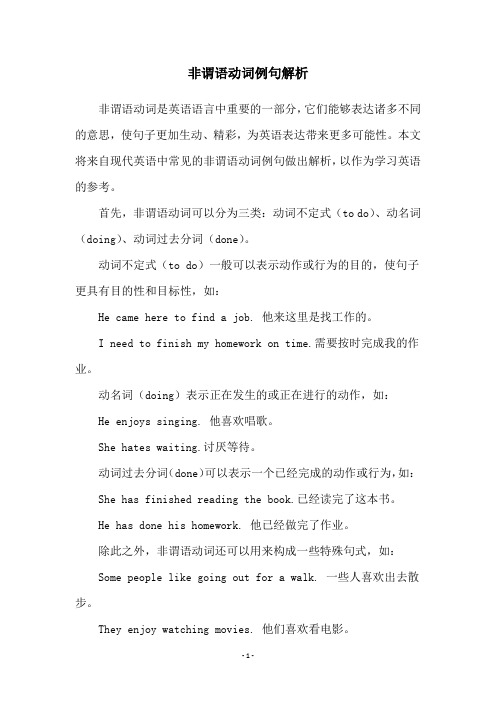
非谓语动词例句解析非谓语动词是英语语言中重要的一部分,它们能够表达诸多不同的意思,使句子更加生动、精彩,为英语表达带来更多可能性。
本文将来自现代英语中常见的非谓语动词例句做出解析,以作为学习英语的参考。
首先,非谓语动词可以分为三类:动词不定式(to do)、动名词(doing)、动词过去分词(done)。
动词不定式(to do)一般可以表示动作或行为的目的,使句子更具有目的性和目标性,如:He came here to find a job. 他来这里是找工作的。
I need to finish my homework on time.需要按时完成我的作业。
动名词(doing)表示正在发生的或正在进行的动作,如:He enjoys singing. 他喜欢唱歌。
She hates waiting.讨厌等待。
动词过去分词(done)可以表示一个已经完成的动作或行为,如: She has finished reading the book.已经读完了这本书。
He has done his homework. 他已经做完了作业。
除此之外,非谓语动词还可以用来构成一些特殊句式,如:Some people like going out for a walk. 一些人喜欢出去散步。
They enjoy watching movies. 他们喜欢看电影。
He likes playing chess. 他喜欢下棋。
这些句式表示的意思都是乐于做某件事的意思,可以表达一种积极的心态。
另外,非谓语动词也可以和其他一些短语一起组成一个短语,从而可以表达某种特殊的意思,如:He spent the whole day writing letters. 他花了整天时间写信。
She finished washing the dishes.洗完了碗。
They stopped talking. 他们停止了谈话。
这些短语表达的意思是把动作做完或停止的意思,而不仅仅是表示动作的发生。
非谓语动词的考点总结
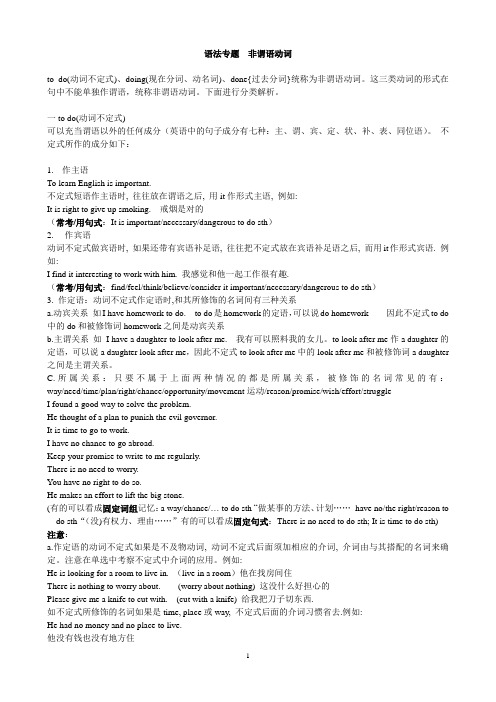
语法专题非谓语动词to do(动词不定式)、doing(现在分词、动名词)、done{过去分词}统称为非谓语动词。
这三类动词的形式在句中不能单独作谓语,统称非谓语动词。
下面进行分类解析。
一to do(动词不定式)可以充当谓语以外的任何成分(英语中的句子成分有七种:主、谓、宾、定、状、补、表、同位语)。
不定式所作的成分如下:1.作主语To learn English is important.不定式短语作主语时, 往往放在谓语之后, 用it作形式主语, 例如:It is right to give up smoking. 戒烟是对的(常考/用句式:It is important/necessary/dangerous to do sth)2. 作宾语动词不定式做宾语时, 如果还带有宾语补足语, 往往把不定式放在宾语补足语之后, 而用it作形式宾语. 例如:I find it interesting to work with him. 我感觉和他一起工作很有趣.(常考/用句式:find/feel/think/believe/consider it important/necessary/dangerous to do sth)3. 作定语:动词不定式作定语时,和其所修饰的名词间有三种关系a.动宾关系如I have homework to do. to do是homework的定语,可以说do homework 因此不定式to do 中的do和被修饰词homework之间是动宾关系b.主谓关系如I have a daughter to look after me. 我有可以照料我的女儿。
to look after me作a daughter的定语,可以说a daughter look after me,因此不定式to look after me中的look after me和被修饰词a daughter 之间是主谓关系。
非谓语动词(不定式)
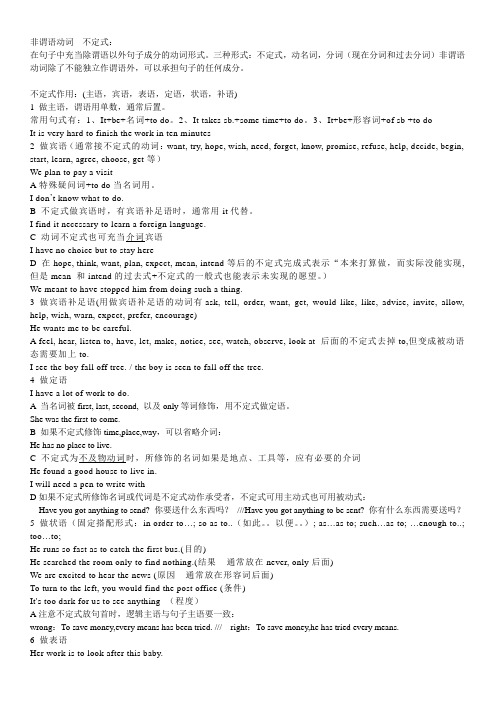
非谓语动词---不定式:在句子中充当除谓语以外句子成分的动词形式。
三种形式:不定式,动名词,分词(现在分词和过去分词)非谓语动词除了不能独立作谓语外,可以承担句子的任何成分。
不定式作用:(主语,宾语,表语,定语,状语,补语)1 做主语,谓语用单数,通常后置。
常用句式有:1、It+be+名词+to do。
2、It takes sb.+some time+to do。
3、It+be+形容词+of sb +to doIt is very hard to finish the work in ten m inutes2 做宾语(通常接不定式的动词:want, try, hope, w ish, need, forget, know, promise, refuse, help, dec ide, begin, start, learn, agree, choose, get等)We plan to pay a visitA特殊疑问词+to do当名词用。
I don’t know what to do.B 不定式做宾语时,有宾语补足语时,通常用it代替。
I find it nec essary to learn a foreign language.C 动词不定式也可充当介词宾语I have no choic e but to stay hereD 在hope, think, w ant, plan, expect, mean, intend等后的不定式完成式表示“本来打算做,而实际没能实现, 但是mean 和intend的过去式+不定式的一般式也能表示未实现的愿望。
)We meant to have stopped him from doing suc h a thing.3 做宾语补足语(用做宾语补足语的动词有ask, tell, order, w ant, get, would like, like, advise, invite, allow, help, w ish, warn, expect, prefer, enc ourage)He w ants me to be c areful.A feel, hear, listen to, have, let, make, notic e, see, w atc h, observe, look at 后面的不定式去掉to,但变成被动语态需要加上to.I see the boy fall off tree. / the boy is seen to fall off the tree.4 做定语I have a lot of work to do.A当名词被first, last, second, 以及only等词修饰,用不定式做定语。
非谓语动词在句中成分易混淆点及其特殊句式
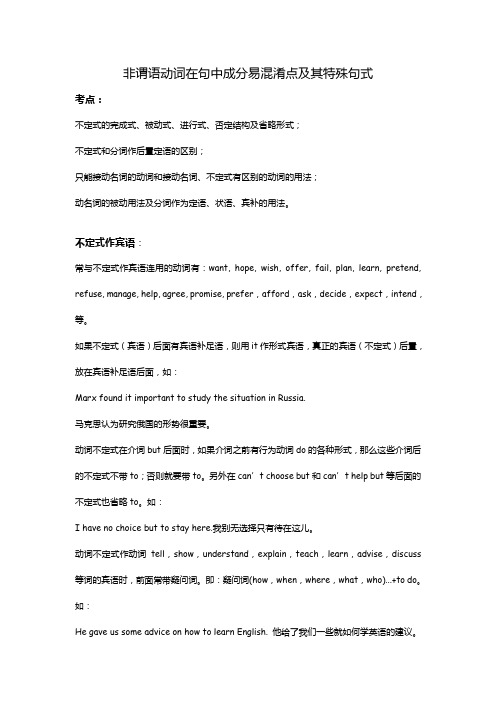
非谓语动词在句中成分易混淆点及其特殊句式考点:不定式的完成式、被动式、进行式、否定结构及省略形式;不定式和分词作后置定语的区别;只能接动名词的动词和接动名词、不定式有区别的动词的用法;动名词的被动用法及分词作为定语、状语、宾补的用法。
不定式作宾语:常与不定式作宾语连用的动词有:want, hope, wish, offer, fail, plan, learn, pretend, refuse, manage, help, agree, promise, prefer,afford,ask,decide,expect,intend,等。
如果不定式(宾语)后面有宾语补足语,则用it作形式宾语,真正的宾语(不定式)后置,放在宾语补足语后面,如:Marx found it important to study the situation in Russia.马克思认为研究俄国的形势很重要。
动词不定式在介词but后面时,如果介词之前有行为动词do的各种形式,那么这些介词后的不定式不带to;否则就要带to。
另外在can’t choose but和can’t help but等后面的不定式也省略to。
如:I have no choice but to stay here.我别无选择只有待在这儿。
动词不定式作动词tell,show,understand,explain,teach,learn,advise,discuss 等词的宾语时,前面常带疑问词。
即:疑问词(how,when,where,what,who)...+to do。
如:He gave us some advice on how to learn English. 他给了我们一些就如何学英语的建议。
不定式作宾语补足语:动词不定式作动词feel,hear,see,watch,notice,observe等感官动词以及have,let,make等使役动词后面的宾语补足语时,不定式符号to要省略。
专题10.非谓语动词考点聚焦和精讲-中考英语语法复习(原卷版)

非谓语动词考点聚焦和精讲不充当句子谓语的动词叫做非谓语动词。
它们不受主语限制,无时态与语态变化,又称非限定性动词。
非谓语动词包括动词不定式、动名词和分词三种形式;其中分词又包含现在分词和过去分词两种形式。
1、动词不定式动词不定式的基本形式为:“to+动词原形”,有些动词可以不用to,这里的to为不定式符号,本身无词义;不定式没有人称和数的变化,在句中不能作谓语,但能保持动词的特点。
动词不定式可作主语、表语、宾语、定语、状语和宾语补足语,初中阶段应该掌握的是不定式作宾语、宾语补足语及目的状语的用法。
(1)动词不定式作主语动词不定式作主语时,常用it作形式主语,而将真正的主语置于句末,这样可使主语不至显得太长,避免头重脚轻的现象。
动词不定式作主语的基本结构是:It+be+形容词(+for/of sb)+to do sth..To learn English well is not easy.=It is not easy to learn English well. 学好英语不容易。
1.It’s easy (for me) that. 我做这事太容易了。
2.It’s difficult for Jim Chinese well. 对于吉姆来说学好中文是困难的。
3.It’s important for us the environment. 保护环境对于我们来说是重要的。
1.It’s very kind him to help us. 他帮助我们,他真好。
2.It’s very nice you to help me. 你来帮助我,你真是太好了。
1.It’s our duty good care of the old.2.It took me half an hour there. 我走到那儿花了半小时的时间。
3.It seemed impossible money. 节约钱似乎是不可能的。
4.It cost a lot of money this museum. 建造这座博物馆花了许多钱。
- 1、下载文档前请自行甄别文档内容的完整性,平台不提供额外的编辑、内容补充、找答案等附加服务。
- 2、"仅部分预览"的文档,不可在线预览部分如存在完整性等问题,可反馈申请退款(可完整预览的文档不适用该条件!)。
- 3、如文档侵犯您的权益,请联系客服反馈,我们会尽快为您处理(人工客服工作时间:9:00-18:30)。
非谓语动词考点归纳一不定式to do1 不定式可在句中做主语。
在绝大数情况下用it作形式主语,不定式放在后面。
形式有:It is...to do sth.../it takes...sb...+to do sth./it is+形容词+for sb. to do sth,/it is十形容词+ of sb. to do sth.09济南35.It’s a good habit________ a walk after dinner.A.to come B.to be C.to take D.to go2不定式在句中做宾语。
1)有些动词后面只能跟不定式作宾语。
初中阶段常见的有agree,apply,afford,choose,dare,decide,determine,expect,manage,offer,pretend,prepare,refuse,want。
如,decide to do,manage to do,pretend to do。
表否定在不定式前加not即not to do08济南43.What do you want when you grow up,Sally?A.to be B.does C.did D.Be08烟台36.The teacher told the boys ________ in the street.A. not playB. not to playC. don’t playD. don’t to play 2)有些动词后面要用动词+it(形式宾语)+补足语+不定式。
如初中阶段常见的有:feel,find,make,think。
如:make it important,find it interesting,feel it easy,think it impossible。
3)有些动词后面要用动词+宾语+不定式。
初中阶段常见的有:allow,ask,expect,invite,order,persuade,teach,tell,want,,warn,would like。
如:allow sb. to do sth.,ask sb. to do sth.,want sb. to do sth.09山西26. My roommate often asks me __________ her to play chess.A.teachB. teachingC. to teach3省略to的不定式在一些表示感官,使役意义的动词后的不定式要省略to。
如:see,watch,notice,hear,listen to,let,make,have09绍兴28. – Is Jack in the library?- Maybe. I saw him ______ out with some books just now.A. goingB. goC. to goD. went05济南43. My aunt played the light music to make the baby crying.A stopped B. stops C. to stop D. Stop2)一些固定短语后面的不定式要省略to。
如:had better do... would rather do...---真题链接---4动词不定式与疑问代词和疑问副词的连用10济南49 —The problem is too difficult, can you show me _______, Wang Le?—Sure.A. what to work it outB. what to work out itC. how to work it outD. how to work out it10东营31. Wow! There are so many books. I really can’t decide __.A. where to buyB. which to buyC. what to buyD. how to buy09齐齐哈尔35. —Are you going to have a sports meeting tomorrow?—Yes, but I’ll call Kate to make sure _______.A. why to startB. when to startC. what to start二动名词doing1有些动词后面只能跟动名词作宾语。
如:avoid,admit,deny,enjoy,finish,keep,mind,practice,risk08济南35.Would you mind the window? It's cold outside.A.going B.putting C.closing D.Taking09扬州8. —What a heavy rain!—So it is. I prefer ___________ at home ___________ on such a rainy day.A. watch TV; to go outB. watch TV; go outC. watching TV; to going outD. to watch TV; going out2一些固定短语中。
如:be busy,be worth,can't help09黄冈39. —Have you seen the TV play My Ugly Mother?—Yes, it’s well worth ___. It’s _______ moving that I’ve seen it twice.A. seeing; tooB. to see; enoughC. seeing; soD. to see; such3一些以介词结尾的动词短语。
如:give up,be afraid of,be used to,pay attention to,look forward to.09宿迁5. The young man used to_______ to work, but he is used to________ to work now.A. drive; walkingB. drove; walkedC. drive; walksD. driving; walk 4动词接不定式作宾语与接动名词作宾语的区别1)在一些表示感官的动词后(see,watch,notice,hear,listen to)用不定式表示完成的动作或经常发生的动作,而用动名词则表示一个正在进行的动作。
09德城18. When he arrived at the office, he found all the workers ______________.A. workingB. workC. to workD. worked2)有些动词后跟不定式作宾语表示动作还没有发生,跟动名词则表示动作已发生。
如:remember,forget,stop等09湛江23. –Please remember _________the light when you leave the room.–OK, I will.A. to turn offB. turning offC. to turn onD. turning on 08烟台27.Stop ________ so much noise! My father is sleeping.A.to makeB. makingC. to hearD. Hearing9年级中考系列复习题-非谓语动词△提高型( )1. I have a lot of things _____ this weekend.A. doB. didC. doingD. to do( )2. You’d better _ upstairs and tell the children_ make so much noise.A. go; not toB. go; don’tC. to go; not toD. to go; don’t( )3. Lily likes _____ the clothes of light colour.A. to put onB. puttingC. to dressD. wearing( )4. It’s too late. Why _____ now?A. not to goB. not goingC. not goD. don’t go( )5. Please don’t forget _____ to me, will you?A. to writeB. writingC. write( )6. When I’m tired, I enjoy _____ music.A. listeningB. listening toC. to hearD. hearing the( )7. Linda was very sorry for being late. But the teacher’s smile made her _____ better. A. feel B. to feel C. fall D. to fall( )8. I heard Mother _____ with Father in the next room at ten last night. A. talk B. talking C. to talk D. is talking( )9. The Great Green Wall will stop the wind from _____ the earth away. A. blow B. to blow C. blowing D. blew( )10. ---Did the teacher tell you _____ this afternoon?---Yes. We’ll go to visit the Science Museum.A. to go whereB. how to doC. what to doD. to do what( )11. We are not sure ____ .A. when to leaveB. when leaveC. when leaves( )12. Meimei went _____ Kate with her Chinese.A. helpB. to helpC. helpedD. helping( )13. _____ is bad for our health.A. Doing eye exercisesB. Go to bed earlyC. Eating too muchD. Taking a walk( )14. Wu Dong is good at _____ English.A. speakB. speaksC. speakingD. spoke( )15. The old woman was _____ tired _____ go any farther.A. too; toB. go; asC. very; to( )16. Would you please _____ drop your shoes on the floor at night?A. not toB. notC. don’tD. won’t( )17. Most of the children enjoy _____ computer games.A. playB. playingC. playedD. to play( )18.She shoul d do her homework now. But she doesn’t feel like _____ it. A. does B. do C. doing D. to do( )19. Uncle Wang can make his kite _____ higher in the sky.A. flyB. fliesC. to flyD. flying( )20. You’d better _____ the cinema by bus.A. don’t goB. to goC. to go toD. go to△综合型( )1. Her wish is _____ a famous singer.A. becomeB. becameC. becomesD. to become( )2. Our monitor is always ready _____ others.A. helpB. helpsC. to helpD. helping( )3. Have you decided _____ for your holidays?A. go whereB. where to goC. to go whereD. where go( )4. Would you please _____ me a chair _____?A. give; to sit onB. give; to sitC. giving; sitD. to give; sit on( )5. There is no difference between the two words. I really don’t know _____.A. what to choose B. which to choose C. to choose which D. to choose what ( )6. Though he had often made his sister __, today he was made __ by his sister. A. cry; crying B. crying; crying C. cry; to cry D. to cry; cry( )7. ---Why are you going shopping if you don’t _____?---My wife wants _____ with her.A. want to; I goB. want; me goingC. want to; me to goD. want; to go( )8. We are often told _____ people in trouble.A. to smilingB. not to smileC. to laughD. not to laugh at( )9. You look so tired. Why not _____ a rest?A. stop havingB. to stop haveC. stop to haveD. to stop to have( )10. What a fine day! How about _____ out for a walk?A. goB. to goC. goneD. going( )11. Mary went _____ after she finished _____ her work.A. swim; doingB. to swim; to doC. to swim; doingD. swimming; to do( )12. Would you mind _____ the window, please? It’s cold outside.A. to closeB. closingC. closedD. close( )13. A fridge is used for _____ vegetable and food cool.A. keptB. keepingC. to keepD. keeps( )14. The farmers on the farm are busy _____ apples on the trees.A. pickingB. to pickC. pickD. picked( )15. One day when Edison was five years old, his father saw him _____ some eggs. A. sat B. to sit C. sitting D. was sitting( )16. She has no paper _____.A. to writeB. to write withC. writing onD. to write on( )17. When class began, we stopped _____ to the teacher carefully.A. listeningB. listenC. listensD. to listen( )18. There are so many kinds of radios in the shop. I can’t decide ___.A. to buy what B. to buy which C. what to buy D. which to buy( )19. ---Do you often hear John _____ in his room?---Listen! Now we can hear him _____ in his room.A. sing; to singB. singing; singingC. sing; singingD. to sing; singing( )20.I usually forget _the door, but I remembered _____ it when I left yesterday. A. closing; closing B. to close; to close C. closing; to close D. to close; closing ( )21.On June 1, boys and girls are busy _____.A. to celebrate Children’s DayB. to celebrate Childrens’ DayC. celebrating Children’s DayD. celebrating Childrens’ Day特殊句式考点归纳一感叹句感叹句表达说话人说话时的惊异、喜悦、气愤等情绪,它常由what或how开头或引导1 感叹词What+强调部分(名词)+(主语+动词谓语)如:What a mess picture it is!05济南40. day it is!A.What a fineB. What fineC. How fineD. How a fineB.10莱芜29.-- __________ beautiful city!--Yes. Lots of tourists come to visit it every year.A.How B.What C.How a D.What a2 感叹词How+强调部分(形容词或副词)+主语+动词谓语如:How wonderful the film is!09河北30. Mary got good grades in school. _____ excited she is!A. WhatB. What aC. HowD. How a二反义疑问句由两部分组成,前半句为陈述句,后半句是一个附着在前半句上的简短问句,回答时用Yes或No1 肯定陈述句+否定附加疑问部分?如:They are interested in collecting stamps, aren't they?一Yes,they are. 是的,他们对集邮感兴趣的。
